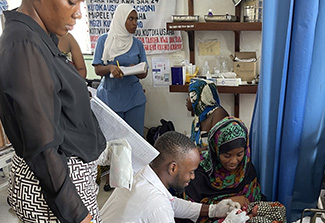Profile: Former Fogarty fellow Siana Nkya tackles sickle cell disease in Tanzania
May / June 2022 | Volume 21 Number 3
An estimated 8,000 to 11,000 children are born with sickle cell disease each year in Tanzania. The nation ranks fifth in the world for the highest rates of the disease, behind only Nigeria, the Democratic Republic of Congo, India, and Angola. Dr. Siana Nkya, a researcher from Tanzania, has focused her career on studying sickle cell disease (SCD) and its genetic determinants in an effort to find new interventions.
Sickle cell disease causes red blood cells, which are typically round, to form more like crescent moons. Round red blood cells move quickly through the blood vessels, but these sickle-shaped cells impair blood flow and result in blood clots and poor oxygen levels, leading to chronic, acute pain syndromes, severe bacterial infections, and tissue death. Fetal hemoglobin is a major sickle cell disease modifier, meaning those with higher levels of it are more likely to experience a milder version of the disease.
Dr. Nkya, seeing the impact of sickle cell disease, chose to research the genetic factors that influence fetal hemoglobin levels in Tanzanians with the disease as part of her Ph.D. After completing her doctorate, Nkya had the opportunity to expand upon her research through a Fogarty Fellowship with the
GloCal Health Fellowship at the University of California, San Francisco. There, she studied patients in Tanzania with high fetal hemoglobin levels, this time looking for specific genetic patterns that might impact their sickle cell disease.
“The way the Fogarty program is designed changed everything for me. The focus on mentored research and career development helped me become more successful as an independent researcher.”
Following her fellowship, Dr. Nkya helped develop a newborn screening pilot program at the Temeke and Muhimbili hospitals, based in Dar Es Salaam, the first ever in Tanzania. In the United States a nationwide newborn screening program for sickle cell disease was implemented in 2006 and has reduced the under-5 mortality rate by up to 94%. There are no nationwide programs like this in any African country today, despite sub-Saharan Africa carrying most of the global SCD burden.
In 2019, Dr. Nkya was awarded an
Emerging Global Leader Award to continue her research, specifically looking at the role of fetal hemoglobin decline and its determinants on sickle cell disease expression in the first three years of a child’s life.
 Photo courtesy of Dr. Siana NkyaDr. Nkya helped to develop a newborn screening pilot program at Temeke and Muhimbili hospitals, based in Dar Es Salaam. The program has now extended to other hospitals in Tanzania, including Mbagala Hospital (pictured).
Photo courtesy of Dr. Siana NkyaDr. Nkya helped to develop a newborn screening pilot program at Temeke and Muhimbili hospitals, based in Dar Es Salaam. The program has now extended to other hospitals in Tanzania, including Mbagala Hospital (pictured).
This study, now in its fourth year, examines the correlation between the age a child presents with sickle cell disease, how high fetal hemoglobin levels impact the severity of the disease, and the rate of fetal hemoglobin decline—all with the goal of developing interventions for sickle cell disease. So far, over 250 children have enrolled and participated in the study.
In addition to her time researching and lecturing, Dr. Nkya, along with her colleague Dr. Mohamed Zahir Alimohamed, founded the Tanzanian Human Genetics Organization (THGO) to advocate for research and training, increased awareness, and diagnostics in human genetics and related fields across the country. They came to the idea after attending an annual conference in Ethiopia in 2018. “We noticed that we were the only Tanzanians there, which made us realize that Tanzania was behind in human genetics research and unable to contribute to these ongoing efforts in Africa.” THGO hosted the African Society of Human Genetics conference in August 2021, the first time the annual conference was held in Tanzania.
In the future, Dr. Nkya hopes that her research will help identify genes and genetic variants in patients with sickle cell disease that will open the door for new interventions and therapeutics. “It has made me hopeful to see that we have more scientists that can do research in Africa, in the context of Africa,” said Nkya. “I hope that we make Fogarty and NIH proud by doing meaningful research that will have an impact for generations to come.”
More Information
Updated August 24, 2022
To view Adobe PDF files,
download current, free accessible plug-ins from Adobe's website.
Related Fogarty Programs
Related World Regions / Countries
Related Global Health Research Topics